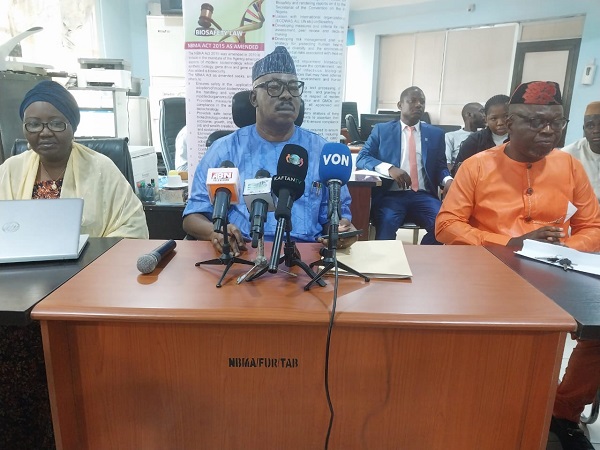
The director-general of the National Biosafety Management Agency (NBMA), Dr. Rufus Ebegba has urged the Federal Government to embrace biotechnology to ensure food security in the country.
Ebegba, who highlighted the achievements of the NBMA during his tenure as its pioneer chief executive, emphasized that modern biotechnology should be prioritised not just for Nigeria, but for the world at large. With challenges such as social disruption, climate change, and youth unwillingness to embrace farming affecting food production, the application of biotechnology can increase crop productivity, improve food quality, and reduce the impact of agriculture on the environment.
Ebegba took up the leadership position of the NBMA on May 28, 2015 and will be handing it over on April 30, 2023.
During his tenure, he has led the agency to achieve significant milestones, including establishing effective capacity-building programmes for the staff and equipping them with the necessary skills and knowledge to carry out their duties effectively.
One of the major achievements of the agency under Ebegba’s leadership is the establishment of the first GMO detection and analysis laboratory in Nigeria. The laboratory is equipped with standard machines and genetically modified organism (GMO) detection kits as well as GM food testing kits for rapid detection in the country. This has helped the NBMA to test GM grains and foods to ensure they pose no risk to human health or the environment before they are allowed into the country.
The NBMA has also developed and approved several regulatory and operational instruments, including the National Biosafety Policy, which is constantly reviewed to keep abreast of advancements in modern biotechnology globally. As a result, Nigeria is seen as one of the leading countries in biosafety, with the international community always wanting to learn from them.
Ebegba emphasised the need for Nigerians to embrace the application of modern biotechnology to ensure food sufficiency in the country. He noted that food production is currently faced with various challenges such as social disruption, climate change, and youth unwillingness to embrace farming. Therefore, the use of modern biotechnology should be prioritised, not just for Nigeria but for the world at large.
“I want to advise that the application of modern biotechnology be embraced to produce enough food for the country, not just for Nigerians alone, but food with sufficient nutrition. Currently, we may have food, but with social disruption in the area of insecurity, climate change and youth unwillingness to embrace farming and other activities within the country, we will definitely face serious challenges in food production.”
He further advised that the application of modern biotechnology be embraced to produce enough food for the country, not just food for Nigerians. He acknowledged that funding remains a major issue for the agency and adequate funding should be provided to establish its headquarters where the staff will have a more suitable environment to operate and be more effective.
Ebegba’s conceded that the world is facing significant challenges with food security and the population is projected to reach 9.7 billion by 2050. Therefore, it is crucial to find ways to increase food production sustainably to ensure that everyone has access to sufficient, nutritious, and safe food.
The application of modern biotechnology can help achieve this goal. Modern biotechnology is the use of genetic engineering techniques to modify living organisms, such as crops and animals, to enhance their characteristics, such as their yield, nutritional content and disease resistance. Biotechnology can help increase crop productivity, improve the quality of food and reduce the impact of agriculture on the environment.
However, the use of biotechnology has been controversial due to concerns about the safety of genetically modified organisms (GMOs) on human health and the environment. Therefore, it is essential to have robust regulatory frameworks to ensure that the use of biotechnology is safe and does not pose a threat to human health or the environment.
Ebegba said the NBMA has played a significant role in regulating biotechnology in Nigeria and ensuring that the use of biotechnology is safe. The establishment of the GMO Detection and Analysis Laboratory and the development of regulatory and operational instruments, including the National Biosafety Policy, are commendable and should be sustained.


